| Welcome! |
 |
|
|
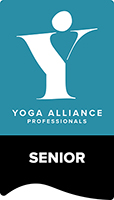
"Saraswati
is a registered SYT teacher with Yoga Alliance
UK.
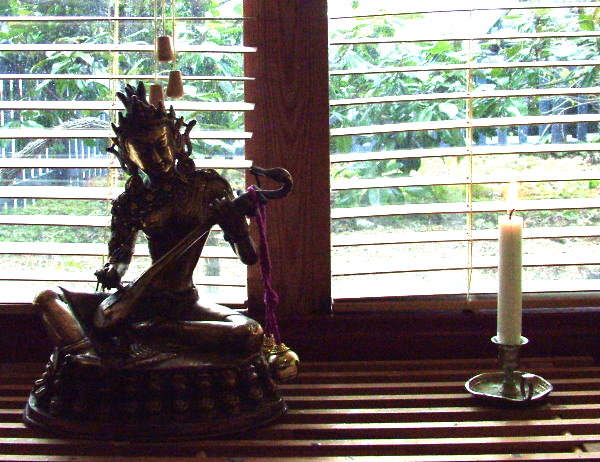
Welcome
to the
Saraswati
Yoga Studio
122 Robin Hood Lane
Sutton London SM1 2SE
Established since 1998
Please see
the 'classes' page
for times.
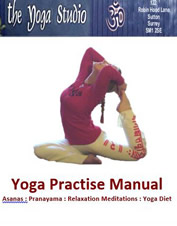
To access Saraswati's one drive teachings please click below
Saraswati Yoga Files

We hope you will find your journey into yoga
to be an enjoyable and fruitful one that will
lead to a more healthy, energetic and peaceful
way of life.
................................more>
|
|
|
| Featured
Postures |
 |
|
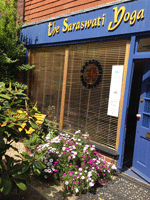
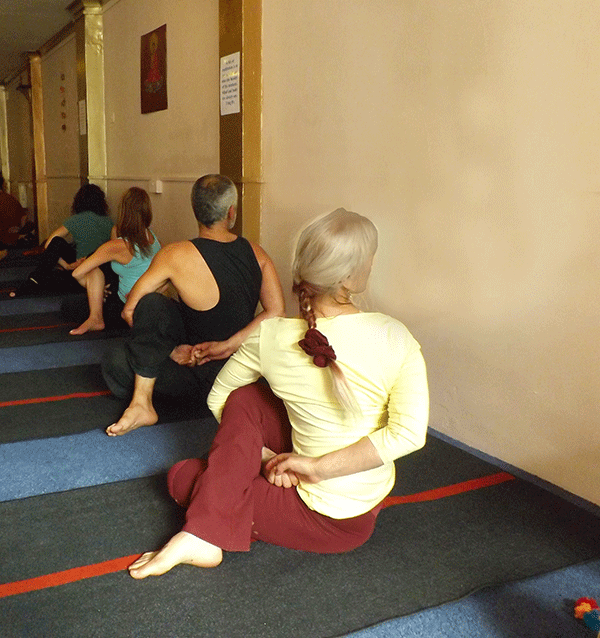
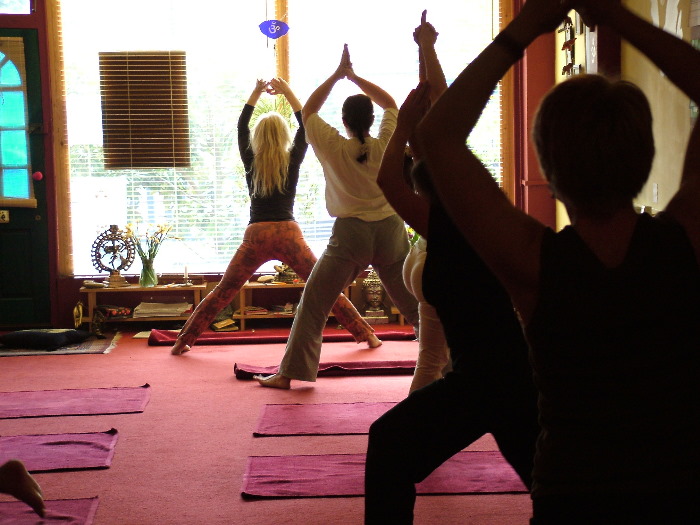
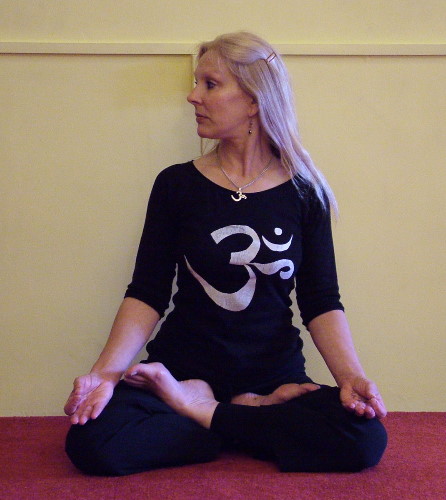
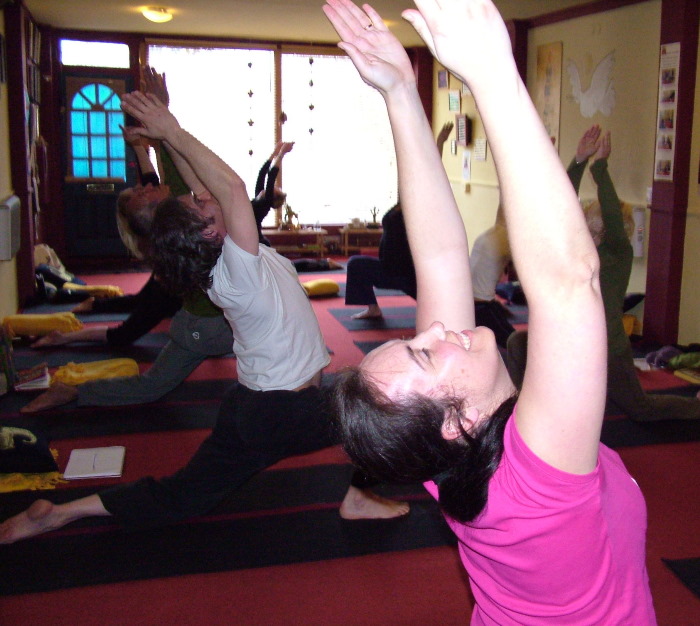
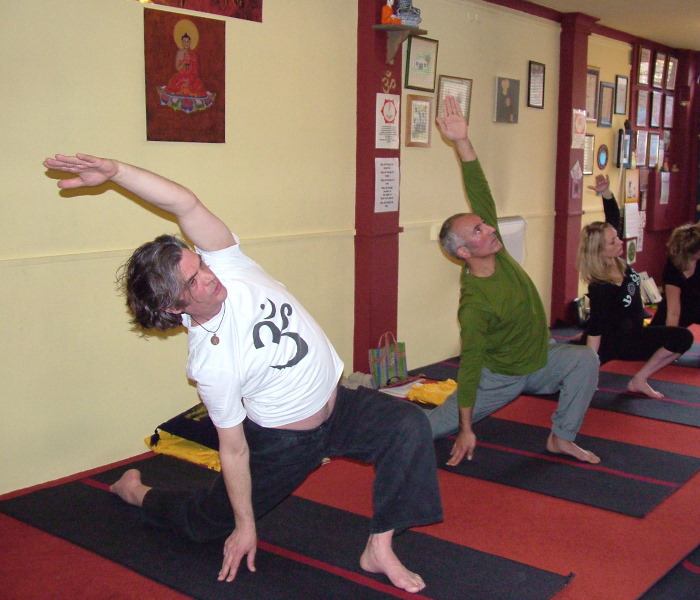
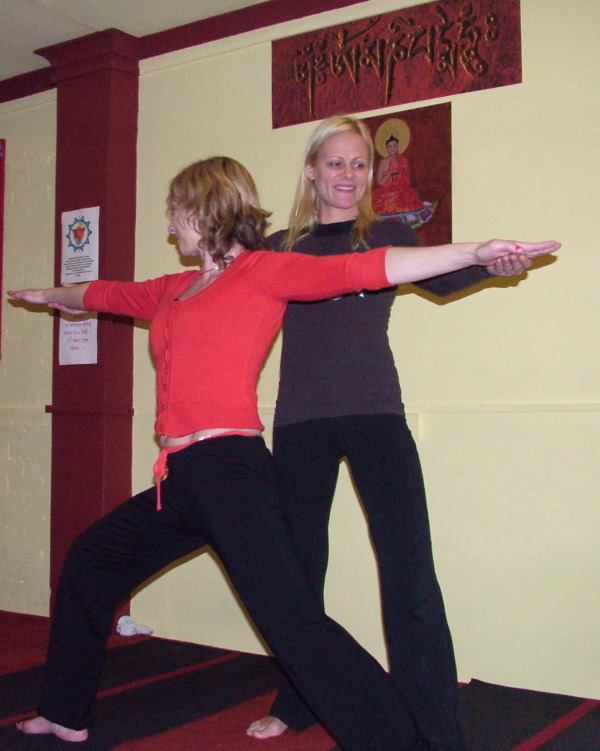

...............................more> |
|
|
| |

The Six Sessions
At the studio we practice six yoga sessions on a rota.
The six sessions allow us to practice a wider variety of poses (asana) breathing exercises (pranayama), relaxations (nidra) and meditations (dhyana).
Settling In
Each of the six sessions starts by sitting in the posture of dignity to practice a few minutes centring with a breathing exercise and/or a meditation. Every session begins with a different meditation or breathing exercise to calm body and mind. The variety is useful because everyone is different and some techniques work better for us than others, learning several calming practices gives us a wider choice of tools to use when we feel tense in our daily life.
Easing out upper body stiffness & tension.
We follow the settling in with a series of safe and gentle poses that ease out stiffness and tension from the upper body…neck, head, shoulders, and upper back. Our heads are heavy weighing about 5 kilos or 10 pounds, that is a lot for neck muscles to carry day in and day out. Our Shoulder muscles are the most flexible joints in our body and that makes them vulnerable. We all carry a lot of tension in our neck and shoulders so it’s good to ease that part of our body first. Each of the six sessions includes practising the neck and shoulder routine.
Caring for the lower body
Then we practice a set of postures to care for our lower body…lower back, abdominal organs and muscles, to strengthen core muscles and improve the flexibility and strength of our hip, knee, and ankle muscles and joints. This set of postures are good to improve the functioning of blood and lymphatic circulations of the lower body. We even work on our toes which helps improve our standing posture and our balance. To care for our lower body in sessions two, three and four, we practice the single leg routine and in sessions one, five and six we practice the Staff pose routine.
Flowing Routines
In each session we then go on to practice a Flow routine. This involves flowing from one pose to another. The ten-minute flowing routines strengthen and stretch most of the body. Most people find them a pleasure to perform. Each of the six sessions offers a different flow. We practice Flowing Strength in session one, Sun Salute in session two, The Spirit Salute in session three, The Cat Routine in session four, The Earth Centre Routine in session five and The Moon Salute in Session Six.
Performing the neck and shoulder routine, lower body routine and a main Flow routine, means that most of the posture practice during the first 30- 40 minutes of the six sessions involves moving from one pose to the next with no holds, or only short holds of the stretch.
We move mindfully in time with slow breaths.
Holding Poses
We then move on to practising postures that involve a longer hold. The hold might be 20-30 seconds or even longer, but everyone is advised to ease out of holding a pose if it gets too much. In fact, everyone is advised to only practice what feels right for them and to rest at anytime during the class and practice some relaxation, or meditation, or just sit breathing deeply until ready to join back in with the main postures.
The main posture practice might vary each week, but each session includes poses that strengthen and stretch the whole body especially back and spine. Each session includes spinal forward folds, back bends, side stretches of the spine and twists or rotations. We often finish with a balance pose.
We also practice some poses where we go half upside down, or even completely upside down such as shoulder stand and headstand. However, we offer more gentle poses for people who would rather not practice the full inversions.
The six sessions give a wide variety of postures, so over the course of 6 weeks we get to practice a variation of standing poses, balance poses, seated poses, supine poses, and kneeling poses.
It is good to get to work on so many different flowing routines and holding postures, it keeps us interested in the practice.
Yoga Breathing
The six sessions also offer variety in breathing exercises. While we practice deep slow breaths throughout each session, we also include time, maybe at the start or the end of the session, to work a specific pranayama. In session one we practice Giving & Receiving breaths, session two Healing breaths, in session three standing Full lung breathing, session four Energising breaths, session five we practice Calming breaths and in Session six Alternate nostril breathing. All these breathing exercises are great healers, they energise our body, calm our emotions and bring more positivity to our minds.
Relaxation
After our posture practice we take ten minutes or so to rest. Yoga nidra, or deep relaxation is an essential part of our practice. For many people it is the most essential part. We need to be able to let go of unnecessary tension in our body and mind. We practice lying down, maybe with a blanket for warmth, and close our eyes and let every muscle from feet to head or head to feet soften and relax.
Each session offers a different way to relax, some include a meditation, or some mindfulness practice, or a visualisation of a peaceful scene.
Practising yoga nidra can help relieve stress and depression. reduces headache, fatigue, and insomnia and lessen the general worn-out feeling so many people experience. Yoga relaxation can also help ease the brain fog a lot of people are suffering from, because it improves mental focus and concentration.
Closing the session
We finish the session sitting in the posture of Dignity the very pose we began it in and become mindful of the benefit we have received from our practice. Yoga has a wealth of philosophical teaching at its core. We complete each of the six sessions with a little teaching from the Yogic tradition. These short (one minute) teachings are inspiring and wise. It is good to finish each session with words that lift our spirits and warm or hearts.
Tried, Tested, and loved!
These six sessions have been taught by me and my teachers for over 30 years. And while we all have our favourites, we enjoy and value each session. Most importantly, we teach and practice each session carefully, mindfully, and safely.
The all-levels classes are suitable for beginners and experienced practitioners.
Pregnant students are welcome to any of the all levels classes. The six sessions are easily adapted to accommodate mums to be.
The gentle classes are the same six sessions adapted for the elderly and less able.
In the advanced classes we adapt the six sessions to provide the experienced practitioner more demanding practice.
Please see
the 'classes' page
for times.

|
|
| |
|
| Events |
 |
|
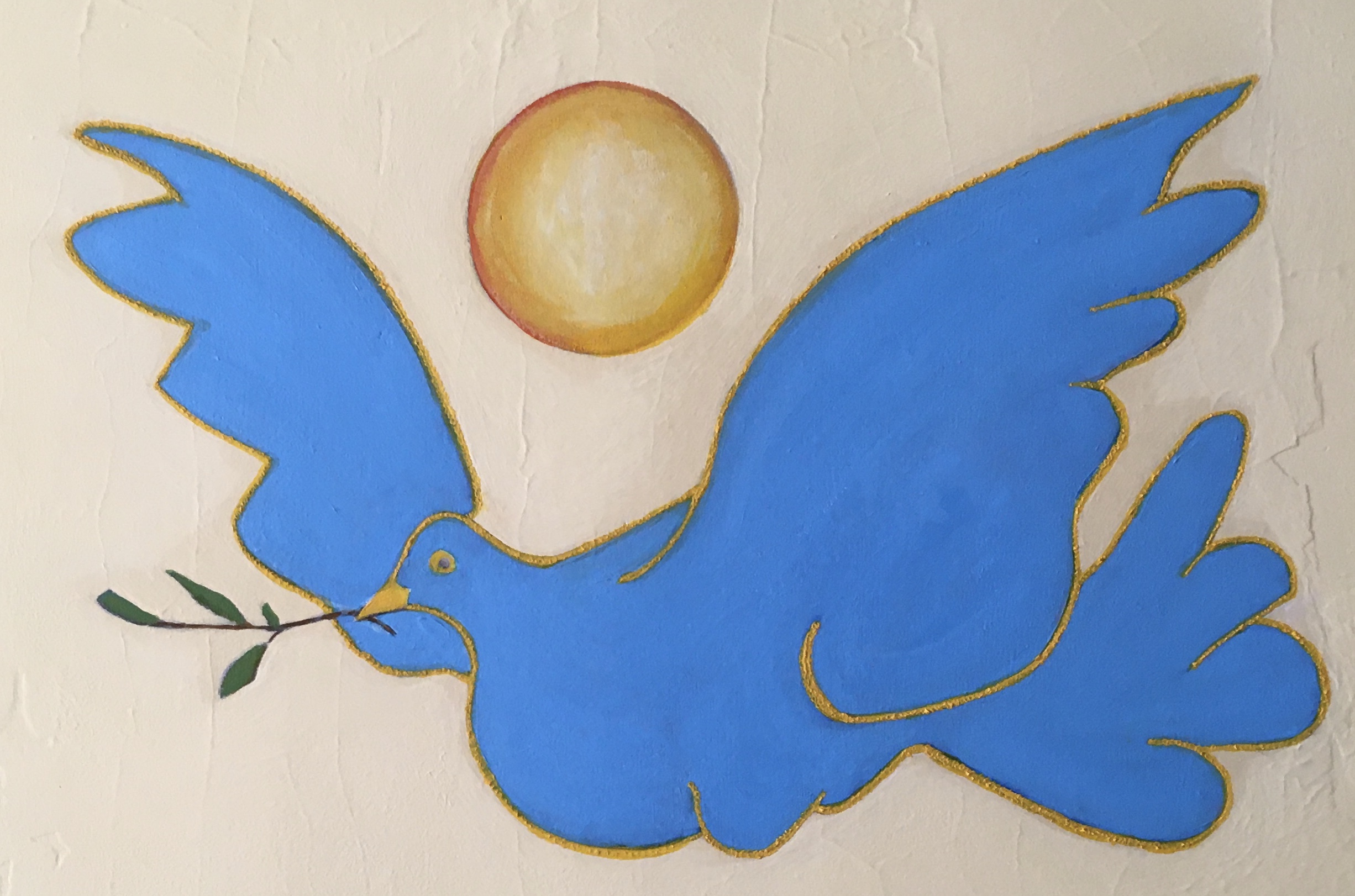
Hello, I hope you are well.
Please see the 'classes' page for class times
If you would like to attend a session
please email me.
If you don't hear back from me in a few days
please check your spam bin or phone me
0208 641 1792
***********
Crystal Singing Bowls Sound Meditation
with Kimaya
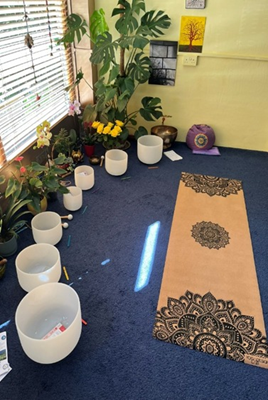
Saturday 21st March 1:45pm- 2:45pm
fee £10:00
see events page for more details
***********
Children's yoga classes
please contact Laura on 07905 504 818
CHILDRENS YOGA PAGE
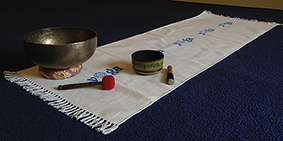
Hatha Yoga practice
Hatha yoga practice, which includes breathing exercises,
stretching exercises and relaxation techniques,
seems to have developed at least 1000 years ago,
although its origins are quite obscure.
One of the concepts behind hatha yoga is that in order to
experience true well-being we need to understand and care for our bodies.
Medical research on hatha yoga shows that it can restore
health to some,
alleviate illness for others and to some extent slow the
ageing process.
The practice of hatha yoga is a powerful preventative medicine.
Regular practice can result in a deep sense of inner security
and strength
Hatha Yoga involves working postures that exercise virtually every part of the body.
And yet no one is too old to practice, for there are gentle poses as well as more challenging ones.
In fact our attitude, rather than the perfection of the pose is the most important factor. The Yogabhashya states that
"The posture becomes perfect, when the effort of achieving it vanishes."
The breathing exercises, relaxations, meditations, and some of the postures are avaialable to all, regardless of age or state of health.
Those who are not so able physically can gain greater mobility by practising the postures and more ability to control pain by practising yoga breathing.
Those who suffer emotional swings find more balance in the breathing, postures, meditation and relaxation practice.
Seekers of self-awareness can increase their understanding through Hatha yoga practice.
Almost anyone who wants to can practice and therefore benefit from Yoga.
It is a journey of self-discovery and helps to develop a more joyful attitude to life. It gives us more energy to lead a more fulfilling life
The self-discipline we develop through regular practice builds up a wealth of inner strength. Yoga practice can induce a sense of well-being, which is so desperately needed by many of us living in a fast, materialistic, competitive and stressful society.
Yoga teaches us how to relax, and once achieved relaxation becomes more and more a state of being.
Those upsetting complaints that often plague us such as feeling tired, being overwhelmed by stress, finding it difficult to sleep, suffering from periods of depression, or any of the physical problems living often brings us, such as headaches, backache, upset stomach, can be significantly eased, or even eradicated by the regular practice of Yoga.
Although the practice of Yoga can't take away the ups and downs of our lives, it can make us stronger physically, emotionally and mentally, so that we are more able to cope.
Best of all, the graceful postures, slow breathing exercises, self-awareness meditations, and tranquil relaxations are a pleasure to perform and experience.
Most people say they feel 'wonderful' after a Yoga session.

|
|
| |
| Meditation Heals

My first solid experience of meditation practice happened many years ago.
I recall in 1978 my sister & I in our twenties attending a Transcendental Meditation seminar in Wimbledon, London.
We booked up for training.
I was given a mantra to meditate on for 20 minutes twice a day, morning and evening. I practised diligently day after day for over two years. I had heard and read of the benefits of T.M. and I so desperately needed help after having recently had a nervous breakdown. The practice helped me.
I still use my mantra. It has helped me throughout the last 40 years.
I have tried many different types of meditation since my first adventure with T.M. practice. I have trained with mantra meditation teachers, mindfulness teachers, loving kindness meditation teachers, self-compassion meditation teachers and chakra yoga teachers and teachers who chant as a form of meditation.
Meditation is an important component of Yoga practice. It is an important part of my life. I love practicing and teaching all the types of meditation that I have learnt from my teachers, such as breath awareness, being in the moment mindfulness meditation, chakra meditation, metta/loving kindness meditation, visualisations, affirmations on words to strengthen and calm our inner experience, all types of mantras including chanting, mindful walking meditation, meditation in movement as in slow yoga practice. All these wonderful ways to meditate have been so very healing for me and for those who have practised with me, and of course for the millions of other people around the world who practice regularly.
There has been a lot of research with good results on the benefits of practicing meditation.
Research has shown meditation practice can change how our brain functions in ways that give us more calmness and cognitive ability. Brain- imaging studies have shown that during meditation practice the frontal lobe part of our brain is engaged and that affects our limbic system, which is the part of our brain that controls our emotions. Meditation can help us manage stress. It can help us deal more calmly and positively with negative emotions such as anger, anxiety and fear. Indeed, long term meditation practice can greatly reduce the frequency and strength of anxiety, anger, depression and fear.
And because meditation is good to relieve stress, depression, anxiety,and panic attacks, it gives us a kinder and better relationship with ourselves and our world. Meditation can even ease some physical problems such as headaches or back pain. And meditation can help ease compulsive habits such as eating junk food, or drinking too much alcohol, or smoking.
When we sit with ourselves practising meditation we calm our whole being enabling us to see the consequences of our habits more clearly and giving us the strength and confidence to change behaviours that have been causing us distress.
I have been teaching meditation and mindfulness practice for over 30 years. The meditation classes I teach at the Saraswati Yoga studio on Wednesday evenings 6:00 – 7:00pm include relaxation and yoga breathing practice. These classes are suitable to everyone, and particularly helpful for those who suffer anxiety, insomnia, panic attacks, or feel overwhelmed with tension and stress, or suffer from depression.
I have found the practice lifesaving.
Here are a few comments from some of the people who attend our Wednesday meditation and relaxation classes...
I have been attending this class for many years now and it has helped me cope better with anxiety and stress and taught me to live in the present moment more. It has quite honestly changed my life!"
Suzy Hanchard
The meditation class has given me lots of tools to help live a calmer life. Before joining i suffered with severe anxiety. That now seems a different life. I can now cope better with what life throws at me. The breathing, relaxation and meditation have literally given me a life. It is truly liberating if you do the practice.
Alison Baker
Meditation has helped me tremendously during my treatment of cancer. Also it has helped me in various situations over the past years such as getting a good night’s sleep during trying moments.
David Baxter

|
|
|
| |
|

